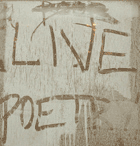(March 2005) Readers who know Latin probably saw that title and assumed that they would be reading a description of the wild sex I had last night. Sorry. I’m not writing about that, but am instead free-thinking about ideas that have been percolating ever since I read an J. Scott Bryson piece and a Sun magazine article and some other useful reminders of the need for unstructured wildness in our busy lives.
Random words and cosmologies and Mary Oliver’s sometimes predictable (but always appealing to naturegrrls like me) poems and Cartesian thought and Native American spirals and the subtle and explosive nuances of spiritual and creative release and unbridled lust and creativity in general and some good hallucinogenic drugs have been percolating in my old noggin ever since I finally put down my books to consider the ways in which embracing wildness and mystery and unstructured movement can explode the boundaries of our logocentric selves and allow us to form deeper connections and interconnections, to grow.
I’ve also been pondering linguistics. Sort of.
Descartes separates thinking minds from the material world—a useful distinction for the objective sciences, no doubt, but, as many a medical doctor trying to understand a so-called non-compliant patient and David Abrams have pointed out, objective sciences can overlook our ordinary, everyday experience of the world in which we live.
Direct experience “is necessarily subjective, necessarily relative to our own position or place in the midst of things, to our particular desires, tastes, and concerns,” so creating such artificial separations can translate into fear of untamed terrain.
This fear, as numerous psychotherapists have noted, thwarts our ability to live fully—and to fully appreciate—a world that is often random and only sometimes controlled by those handy weather charts and scowling schoolmarms and fire-and-brimstone ministers who insist that we will find salvation—or at least relative safely and a good job—if we restrict ourselves to the landscape they prescribe.
We burst those strictures eventually though, don’t we? Raise our partitions enough to release the pressure that threatens to boil over from within, catch the whoosh of an owl flying overhead or the scent of an unexpected rain shower and then, all of a sudden, artificial deadlines and forced commitments and unnatural work expectations fall by the wayside and we know it again: nature, our wildness, a fleeting moment of internal and external harmony.
We return to that sacred wilderness that Max Oelschlaeger describes as “a spontaneous and naturally organized system in which all parts are harmoniously interrelated.” Yep, the same system that can slam into us with twenty-food tidal waves or flood our living rooms or make us leave our lovers and homes and take up with the wildest things. (Powerful stuff, ain't it?)
People have been proclaiming the danger of raising children in a way that is devoid of everyday wildness and mystery and organic connection and loss of control for years now. These children, they say, grow up suspicious of the dangerous and uncivilized, the undomesticated, at their own peril.
Native-American poet Joy Harjo has pointed out that even our chickens have become too civilized.
She says, wisely, that
Europe . . . gifted us with inventions, books and the intricate mechanics of imposing structures on the earth, but there are other means to knowledge and the structuring of knowledge that have no context in the European mind.
We have an instinctual need to survive at the emotional as well as physical level, and recognizing that we are wild at our core helps us do that.
Of course Cartesian rationality is useful too, but an over-reliance on rationality can be fatal to our spirits.
We creative types especially must access our full selves in order to create authentically, so tamping down our instincts can lead to all kinds of soul-damaging behaviors such as drinking till our livers pickle or swallowing our connections until we become mere shells of ourselves, the very embodiment of Dante’s sad vanilla “trimmers, neutral, weak in spirit” people who live on the earth while never really living.
Now I’m as logocentric as the next INTP, but the poet in me recognizes the existence of worlds and experiences and sacred planes that would be unreachable to me if I limited myself to Cartesian rationality.
I celebrate so-called wild experiences, seek them out in my own particular raised-in-the-deep-south, slide-that-car-around-another-curve-sideways-and-let-out-a-woohoo-while-doing-it way that keeps my spirit alive (till I misjudge a curve, anyway).
So color me undomesticated (please!) but, here’s my firm belief: Rationality helps me understand and interpret my surroundings based on projection and the principles of logic, but poetry and other unstructured creative endeavors, like great sex, escort me to dangerous worlds where I truly live.
Harjo says this about the writing process:
Each time I write I am in a different and wild place, and travel toward something I do not know the name of. Each poem is a jumping-off edge and I am not safe.
Oelschlaeger again: “Human beings are not pure thinking things ensconced within Euroculture, but [are] beings whose thoughts and feelings are embodied, centered, in an organic human nature fashioned in the web of life over the longueurs of space and time, internally related to nature.”
Harjo: “To survive is sometimes a leap into madness.”
That madness can get us locked up. But it can also expand our worlds.


No comments:
Post a Comment